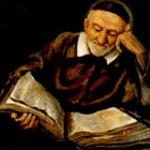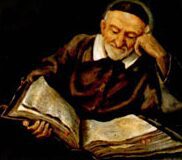 What is the best way to study about Vincent? Although Vincent himself did not write books we do have about 4,000 letters and a a host of bibliographies. This edition of Saturday Study Hall offers Thomas Davitt, CM perspectives on Vincent’s writing and the many biographies of Vincent in this reflection VINCENT DE PAUL: WHAT AND HOW TO READ ABOUT HIM
What is the best way to study about Vincent? Although Vincent himself did not write books we do have about 4,000 letters and a a host of bibliographies. This edition of Saturday Study Hall offers Thomas Davitt, CM perspectives on Vincent’s writing and the many biographies of Vincent in this reflection VINCENT DE PAUL: WHAT AND HOW TO READ ABOUT HIM
- 1 Introduction
- 2 Reading biographies
- 3 What Vincent wrote
- 4 Reading Books and Articles about Vincent
- 5 Conclusion
- 6 Tailpiece
What follows is a slightly abridged version of the original article.
- … The content of many of the talks seemed to be for the few confreres who might be doing some research on Vincent or the Congregation, rather than for the ordinary confrere who wants to deepen his knowledge without being either an expert or a specialist.
—Part of our initial formation in the community was to read a biography of Vincent. From this we learnt the main events of his life, what he did. We were teenagers at the time, and therefore gained a teenager’s view of Vincent. Some confreres may never have progressed beyond a knowledge of the events of Vincent’s life and a teenager’s understanding of them.
Two areas of progress and development are required. First, progress from a knowledge of what Vincent did to a knowledge of what sort of a man he was. Remember, a person is canonised as a saint because of the sort of person he or she was, not because of what he or she did. Second, progress from a teenager’s understanding of Vincent to that of an adult. This progress is a lifelong development, as we need to keep coming back to Vincent all the time in the light of our own lived experience.
After we have got to know what Vincent did and what sort of a man he was we should have become sufficiently interested in him to want to know what were his views on various matters, what he wrote and what he said.
Biographies
There are many short and medium-length biographies of Vincent available in various languages, many translated from the major European languages. It is useful to read, or re-read, these from time to time, or at least to read parts of them. Very often something fresh will strike us, or we will see something in a new light.
Confreres from each language group will know which are considered the best in their own language. “The World of Monsieur Vincent” by Mary Purcell, an Irish laywoman, was published in 1963 and re-printed in 1989. Many people think it is the best book in English on Vincent. It has been translated into Indonesian. Jean Calvet’s biography, published in French in 1948, was translated into English in 1952. Luigi Mezzadri’s short biography came out in 1989 and has been translated into French, English and Spanish.
The three major biographies are those by Louis Abelly, Pierre Coste and Jose Maria Roman.
(This presentation pre-dates the excellent work Vincent de Paul: The Trailblazer by Bernard Pujo)
Abelly’s book was published in 1664, four years after Vincent’s death. ….
Coste’s three-volume biography was published in 1932. …
Jose Maria Roman’ s work was published in 1981, the first major biography since Coste. It is shorter than either Abelly or Coste, but it takes into account the progress which has been made in Vincentian studies in the half century since Coste.
Vincent’s own writings
The surviving writings of Vincent were published by Coste in twelve volumes, eight of letters and four of conferences. None of this material was intended by Vincent for printing or publication. The only work which he intended for printing and limited circulation was the Common Rules of the Congregation of the Mission.
I want to say something about these writings under four headings: The Common Rules, the letters, the conferences to the St. Lazare community, and the conferences to the Daughters of Charity.
Vincent wrote the Common Rules in Latin. … The Common Rules have one great defect. Vincent combined two things in one book, guidelines on spirituality and guidelines on administration. In the guidelines on administration there are some things which belong to the 17th century and there are some things which belong to France. Anything which is completely 17th century or completely French we, who are neither 17th century nor French, can ignore. Much of the material concerning the administration of community houses falls into one or other of these categories.
Most of the material in the Common Rules concerning spirituality is still valid for us in the 20th century, because it deals with the unchanging basics of a person’s relationship with God: prayer, scripture reading, other spiritual reading, relationship with other people, virtues and self-discipline.
….
More than 3,000 of Vincent’s letters have survived. It has been estimated that he wrote about 30,000, which is probably an over-estimation.
(Again this article predates new translations produced over the last decade.)
Vincent’s letters, as I already said, were addressed to individual persons about particular matters relevant to those persons. This means that we cannot always apply to ourselves or to others what he wrote in a letter. They are interesting to us because they show how vincnet dealt with people and with situations. This means that we should, if possible, kknow something about the person to whom the letter was addressed, about the house in which he lived, and about the situation in question. The date of the letter will show at what period of Vincent’s life it was written, and this could be interesting as what he said in the earlier part of his life might be different from what he said later.
Finally, most of the letters do not deal with spirituality. When a letter does deal with spirituality we have to remember, once again, that it was written for a particular person in a particular situation and it may not be for general application.
Vincent de Paul Correspondence, Conferences, Documents
…
When he gave conferences to the Daughters Vincent would often give Louise the notes he had prepared for the conference, and she would often give back to him for revision her re-construction of the conference. He never did this with the conferences to the confreres.
When we read the conferences to the Daughters we must always keep in mind that they were given to a very particular audience, most of whom were uneducated and very many of whom were illiterate. Vincent adapted his ideas on spirituality to this audience, and we cannot take as general guidelines what he said to them. ….
I do not want to recommend individual books or articles, which many of you might not be able to get or to read. I want suggest how to get most benefit from what is available to each of you.
If you see an article on Vincent in any review or magazine, in a language which you can read, take a quick look through it to see if it appeals to you personally. Remember, not every article on Vincent will appeal to every individual confrere. If you think it would interest you, read it through completely, but quickly. Then, if you think it is worthwhile, read it again more carefully and make notes as you read; also note the year and number of the issue so that you can find the article again later.
That last point is important. Obviously some articles are better than others. Also some articles make a greater personal appeal than others. Such articles should be read more than once and it is important to be able to find them again when we want to. It is very frustrating to remember that I read something somewhere and yet cannot remember exactly where when I want to read it again.
The purpose of this talk is so help the ordinary non-specialist confrere to deepen his knowledge and understanding of Vincent….
Some of you, or perhaps all of you, may have noticed that I did not refer to Saint Vincent, except in the quotations from the Constitutions and from Fr. Richardson’s letter.. The title “Saint” refers to Vincent’s present status and it is misleading to use it in connection with events during his life. For example, it is incorrect to say “St. Vincent preached at Folleville on 25 January 1617” He was not a saint that day and if he had died the next day he would never have been canonized. We must try to get to know the man as he was at the different periods of his life. We must try to get to know him as a man, as a priest working inClichy, Chatillon and the de Gondi household. We must try to get to know him as a confrere, and as superior general of an expanding congregation. His letters are the principal means of doing this. But we must, at all costs, avoid the danger of thinking of him as “a saint” at all moments, and in each of the events, of his life.
(Ed. Note: If you made it this far you have earned the rest of the weekend for your own pursuits!)
Tags: biography, Featured, Saturday Study Hall, Vincent, Writings

